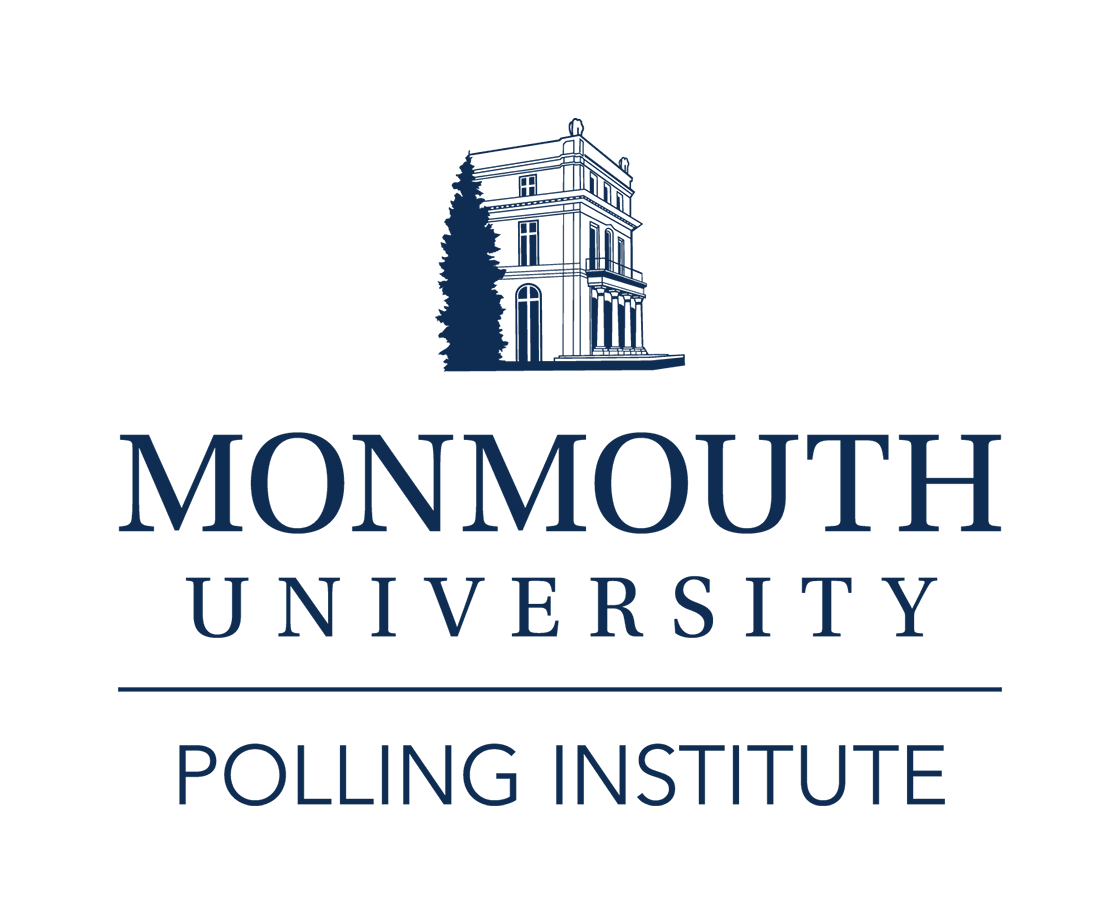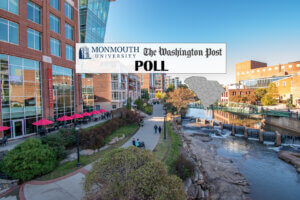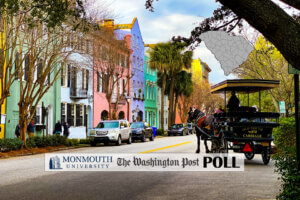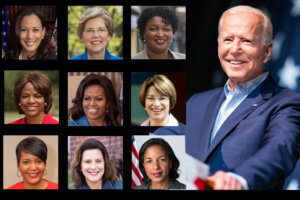West Long Branch, NJ – Donald Trump holds a commanding lead among likely South Carolina primary voters just days before they cast their ballots for the Republican nomination. The Monmouth University Poll also finds that Trump holds significant advantages with almost every demographic group.
Among voters likely to participate in South Carolina’s GOP primary on Saturday, 35% currently support Trump, 19% support Ted Cruz, and 17% support Marco Rubio. John Kasich registers 9%, Jeb Bush has 8%, and Ben Carson has 7%.
Trump is the clear favorite of voters who have not been to college (53%), but also garners the support of about 3-in-10 voters with a college education. He leads among both men (36%) and women (34%); among voters under 50 years old (34%) and those age 50 or older (35%); among voters in veterans’ households (38%) as well as non-veterans (32%); and among evangelical Christians (33%) and non-evangelicals (37%) alike. Cruz (31%) barely nips Trump (27%) among very conservative voters, but Trump enjoys the most support of any candidate among somewhat conservative (40%) and moderate (41%) voters.
Overall, 42% of likely voters say they are completely decided on their candidate choice. Another 31% have a strong preference but are willing to leave their options open. Just 11% say they only have a slight preference and 17% say they are really undecided about what they will do on Saturday. In line with Monmouth’s polls just before the Iowa and New Hampshire contests, South Carolina supporters of Trump (57%) and Cruz (49%) are more likely than other voters to have locked in their vote choice.
Driving Trump’s broad-based support is the sense that the next president needs to be someone from outside government (54%) rather than someone with government experience (33%). This sentiment has not changed much since last summer. Furthermore, nearly 2-in-3 likely primary voters are either very (33%) or somewhat (30%) dissatisfied with the Republican leadership in Congress. Just 35% are satisfied.
“The overwhelmingly negative feelings of South Carolina Republicans toward the political establishment have helped Trump build upon the support he enjoyed since the summer,” said Patrick Murray, director of the independent Monmouth University Polling Institute in West Long Branch, NJ. “The fact that six candidates are still in the race partly accounts for the size of his lead, despite the fact that he has relatively high negative ratings overall.”
Trump’s current 35% showing in the vote choice question is slightly higher than the 27% share he took in November and 30% share in August. But his favorability rating has dropped slightly to 50% from the 58% level he had in November. His unfavorable rating now stands at 41%, up from 29% in the fall.
Cruz’s 19% vote share is up from 9% in November and 5% in August. His personal rating of 45% favorable and 39% unfavorable, though, is more negative than the 52% favorable and 21% unfavorable rating he received last fall.
Rubio’s 17% vote share is up from 11% in November and 6% in August. His personal rating has slipped slightly, but is still largely positive at 54% favorable and 28% unfavorable. This compares with 62% favorable and 18% unfavorable in November.
John Kasich’s vote share of 9% is significantly higher than the 1% share he got in November and 3% in August. Still many South Carolina primary voters have no opinion of the New Hampshire runner-up – 43% have a favorable opinion of him, 22% have an unfavorable opinion, and 34% have no opinion.
“Jeb Bush has probably had the most stable opinion in South Carolina polling over the past few months. Unfortunately for him, it has not been good,” said Murray. Bush’s 8% vote share is basically unchanged from past polls – it was 7% in November and 9% in August. His personal rating is split at 43% favorable and 43% unfavorable. This is basically unchanged from his 41% favorable and 43% unfavorable rating last fall.
Carson’s vote share is the only one that has taken a tumble over the past few months, even though he remains the best-liked candidate in the field. His current 7% vote share is down from his 28% high point in November and his 15% second-place showing in August. Still, 62% of likely GOP primary voters have a favorable opinion of Carson and just 19% hold an unfavorable view of him. This is slightly lower than the 76% favorable and 12% unfavorable rating he had when he was riding high in the polls last fall.
The Monmouth University Poll was conducted by telephone from February 14 to 16, 2016 with 400 South Carolina voters likely to vote in the Republican presidential primary. This sample has a margin of error of ± 4.9 percent. The poll was conducted by the Monmouth University Polling Institute in West Long Branch, NJ.
DATA TABLES
The questions referred to in this release are as follows:
(* Some columns may not add to 100% due to rounding.)
1. If the Republican primary election for president was today, would you vote for – [NAMES WERE ROTATED]
| Feb. 2016 | Nov. 2015 | Aug. 2015 | |
| Donald Trump | 35% | 27% | 30% |
| Ted Cruz | 19% | 9% | 5% |
| Marco Rubio | 17% | 11% | 6% |
| John Kasich | 9% | 1% | 3% |
| Jeb Bush | 8% | 7% | 9% |
| Ben Carson | 7% | 28% | 15% |
| (VOL) Other | 0% | 0% | 0% |
| Chris Christie |
n/a | 1% | 2% |
| Carly Fiorina |
n/a | 2% | 6% |
| Jim Gilmore |
n/a | 0% | 0% |
| Lindsey Graham |
n/a | 1% | 4% |
| Mike Huckabee |
n/a | 2% | 3% |
| Bobby Jindal |
n/a | 0% |
<1% |
| George Pataki |
n/a |
0% |
<1% |
| Rand Paul |
n/a |
1% | 3% |
| Rick Santorum |
n/a |
<1% | 1% |
| Rick Perry |
n/a |
n/a |
<1% |
| Scott Walker |
n/a |
n/a | 4% |
| (VOL) Undecided |
5% | 9% | 11% |
| (n) | (400) | (401) | (453) |
2. Which of the following best describes where your decision stands at this moment: I am completely decided on which candidate I will support, I have a strong preference right now but I am willing to consider other candidates, I have a slight preference among a group of candidates I like, or I am really undecided among a number of candidates?
| Feb. 2016 | Nov. 2015 | |
| Completely decided | 42% | 17% |
| Strong preference | 31% | 39% |
| Slight preference | 11% | 23% |
| Undecided | 17% | 20% |
3. Please tell me if your general impression of each of the following candidates is favorable or unfavorable, or if you don’t really have an opinion. [NAMES WERE ROTATED]
|
Favorable | Unfavorable |
No | |
| Jeb Bush |
43% | 43% |
14% |
| –November 2015 |
41 | 43 |
16 |
| –August 2015 |
52 | 32 |
16 |
| Ben Carson |
62% | 19% |
19% |
| –November 2015 |
76 | 12 |
12 |
| –August 2015 |
72 | 9 |
19 |
| Ted Cruz |
45% | 39% |
16% |
| –November 2015 |
52 | 21 |
27 |
| –August 2015 |
47 |
21 |
32 |
| John Kasich |
43% |
22% |
34% |
| –November 2015 |
n/a | n/a |
n/a |
| –August 2015 |
32 |
17 |
51 |
| Marco Rubio |
54% |
28% |
17% |
| –November 2015 |
62 |
18 |
19 |
| — August 2015 |
58 |
16 |
26 |
| Donald Trump |
50% |
41% |
9% |
| –November 2015 |
58 |
29 |
13 |
| — August 2015 |
58 |
28 |
14 |
4. Regardless of who you support, what do you think the country needs more in the next president: someone with government experience who knows how to get things done OR someone outside of government who can bring a new approach to Washington? [CHOICES WERE ROTATED]
| Feb. 2016 | Aug. 2015 | |
| Someone with government experience | 33% | 28% |
| Someone outside of government | 54% | 61% |
| (VOL) Both | 9% | 9% |
| (VOL) Don’t know | 5% | 2% |
5. How satisfied are you with the Republican leaders in Congress – are you very satisfied, somewhat satisfied, somewhat dissatisfied, or very dissatisfied?
| Feb. 2016 | |
| Very satisfied | 3% |
| Somewhat satisfied | 32% |
| Somewhat dissatisfied | 30% |
| Very dissatisfied | 33% |
| (VOL) Don’t know | 2% |
6. How important to you are veterans’ issues in your vote for president in the Republican primary – is it the most important factor, one of several important factors, a somewhat important factor, or not that important a factor?
| Feb. 2016 | |
| The most important factor | 17% |
| One of several important factors | 55% |
| A somewhat important factor | 24% |
| Not that important a factor | 4% |
| (VOL) Don’t know | 1% |
The Monmouth University Poll was sponsored and conducted by the Monmouth University Polling Institute from February 14 to 16, 2016 with a statewide random sample of 400 South Carolina voters drawn from a list of registered voters who participated in at least one South Carolina primary in 2012 or 2014, or in both the 2012 and 2014 general elections and indicate they will vote in the Republican presidential primary in February 2016. This includes 219 contacted by a live interviewer on a landline telephone and 181 contacted by a live interviewer on a cell phone, in English. Monmouth is responsible for all aspects of the survey design, data weighting and analysis. Final sample is weighted for age and gender based on state registration list information on the pool of voters who participate in primary elections. Data collection support provided by Braun Research (field) and Aristotle (voter list and non-voter sample). For results based on the total sample, one can say with 95% confidence that the error attributable to sampling has a maximum margin of plus or minus 4.9 percentage points (unadjusted for sample design). Sampling error can be larger for sub-groups (see table below). In addition to sampling error, one should bear in mind that question wording and practical difficulties in conducting surveys can introduce error or bias into the findings of opinion polls.
| POLL DEMOGRAPHICS (weighted) | |||
|
47% State primary voter | 50% Male | 9% 18-34 |
94% White, non-Hispanic |
|
53% Other voter | 50% Female | 27% 35-49 |
6% Other |
|
37% 50-64 | |||
|
28% 65+ | |||
Click on pdf file link below for full methodology and results by key demographic groups.




